Detroit 2011: Porsche unveils the 918 RSR Hybrid
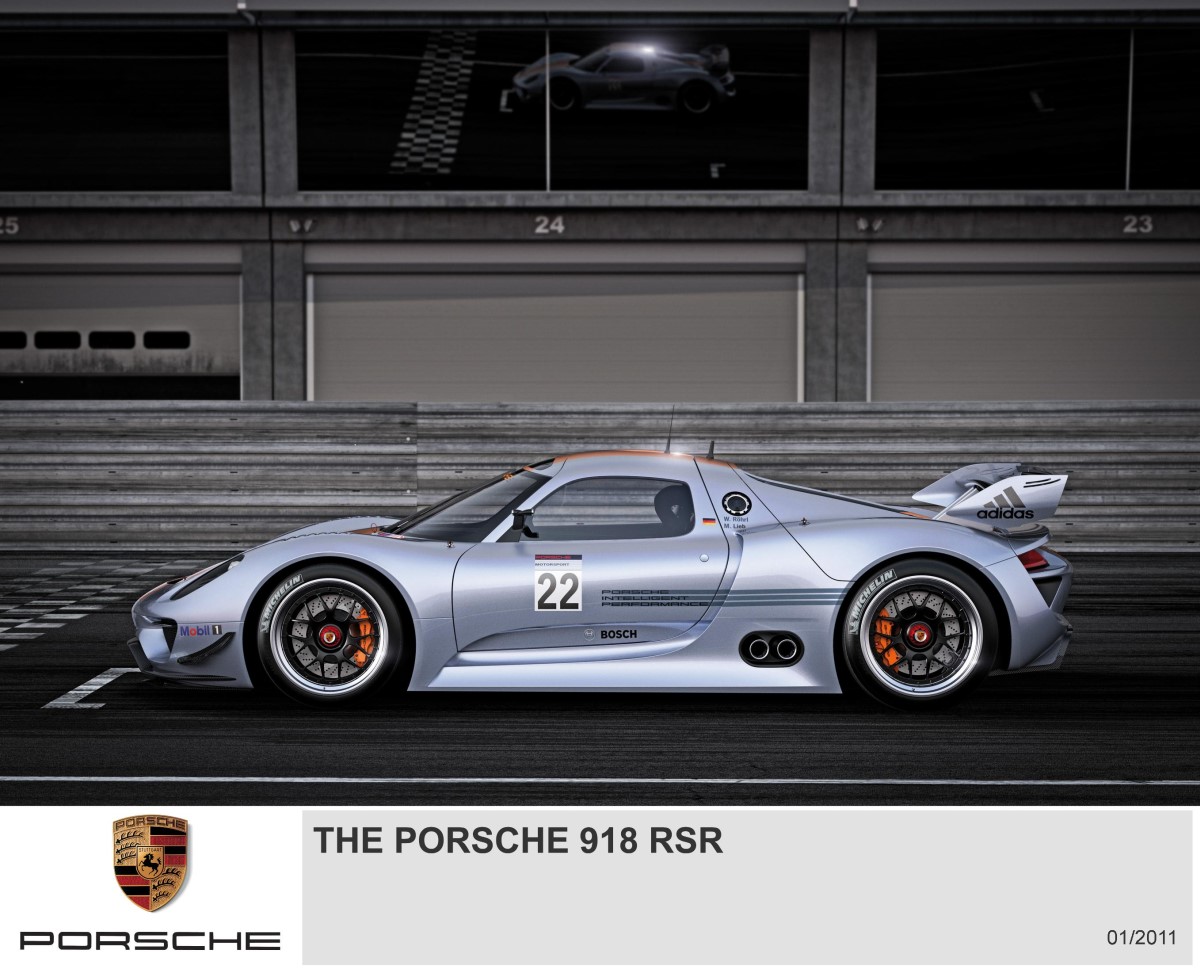 |
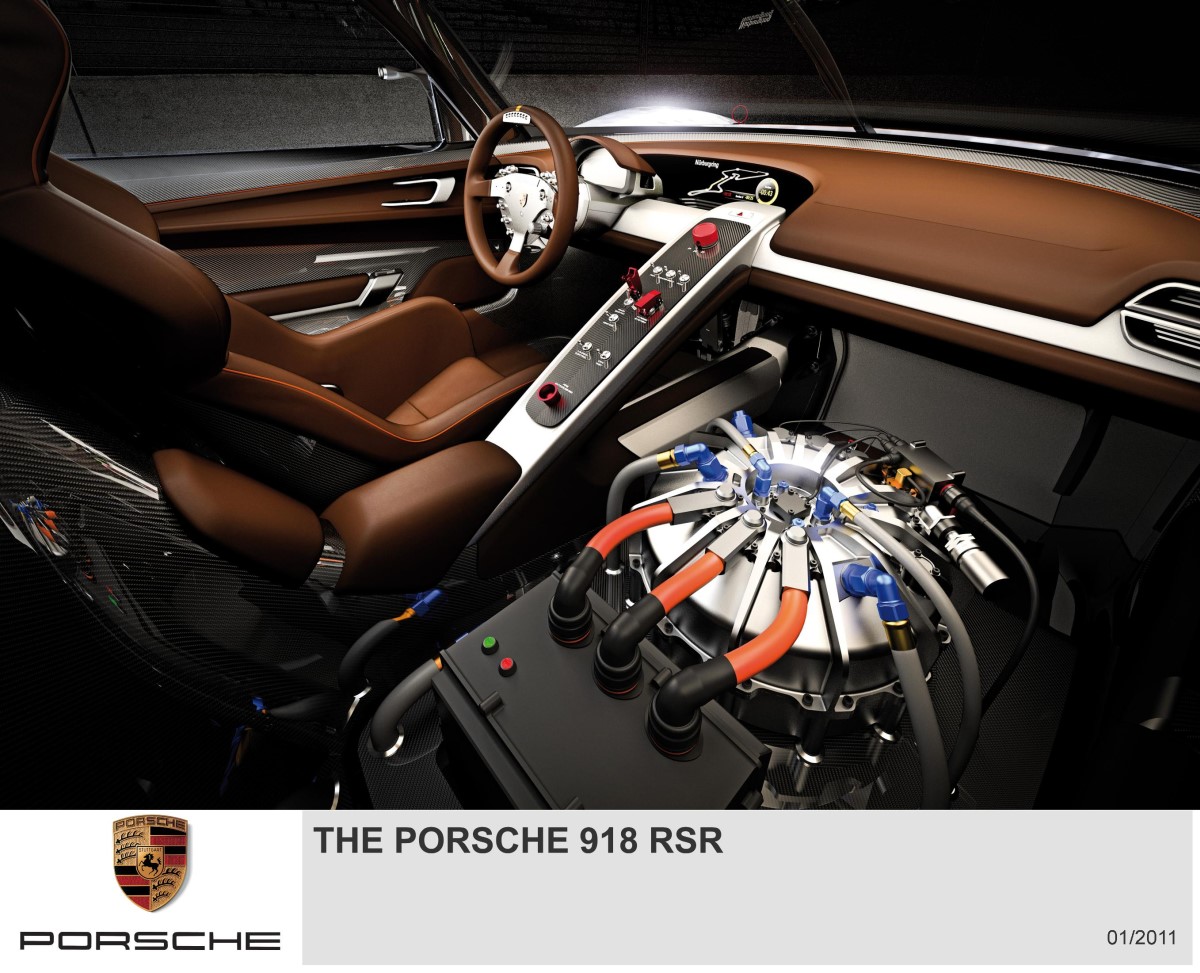 |
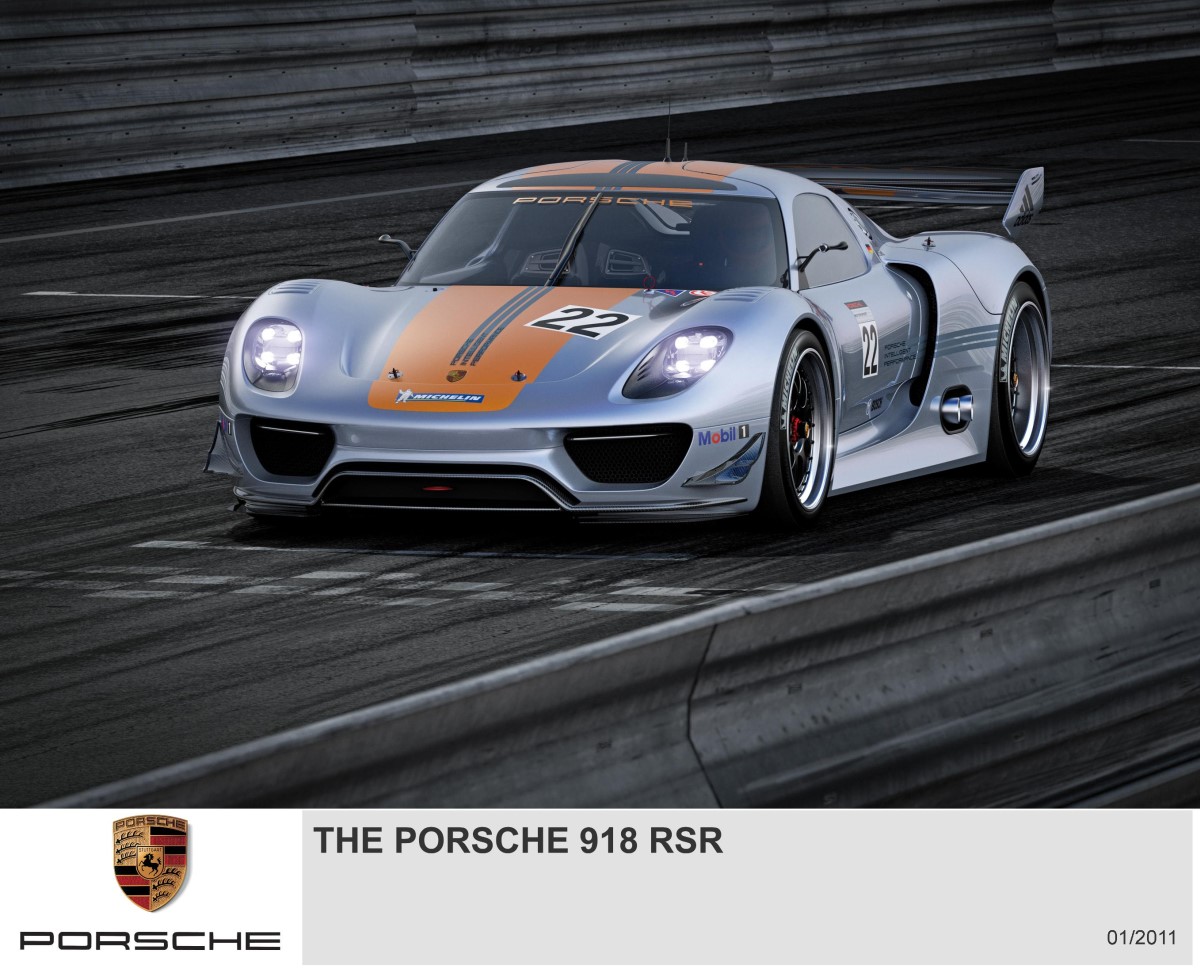 |
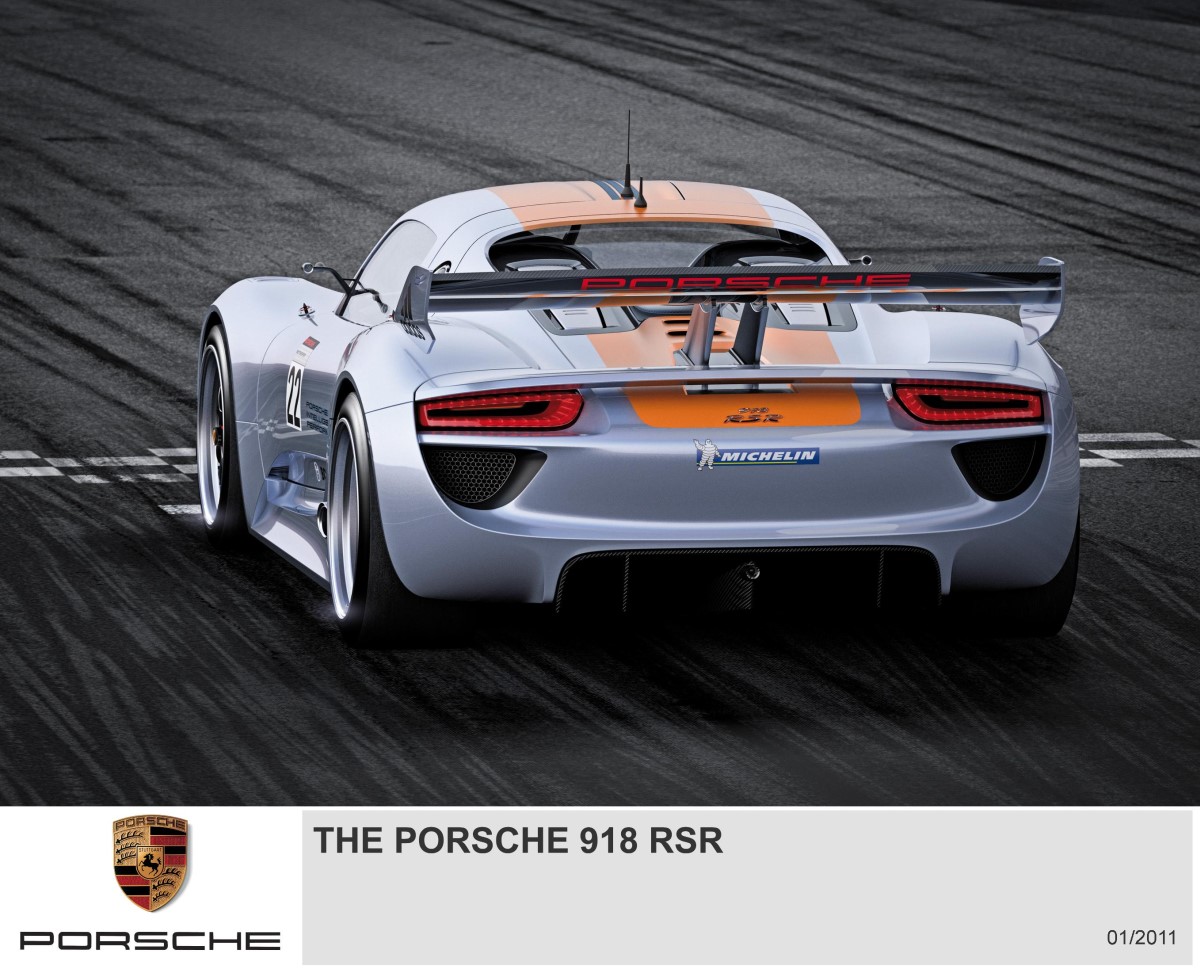 |
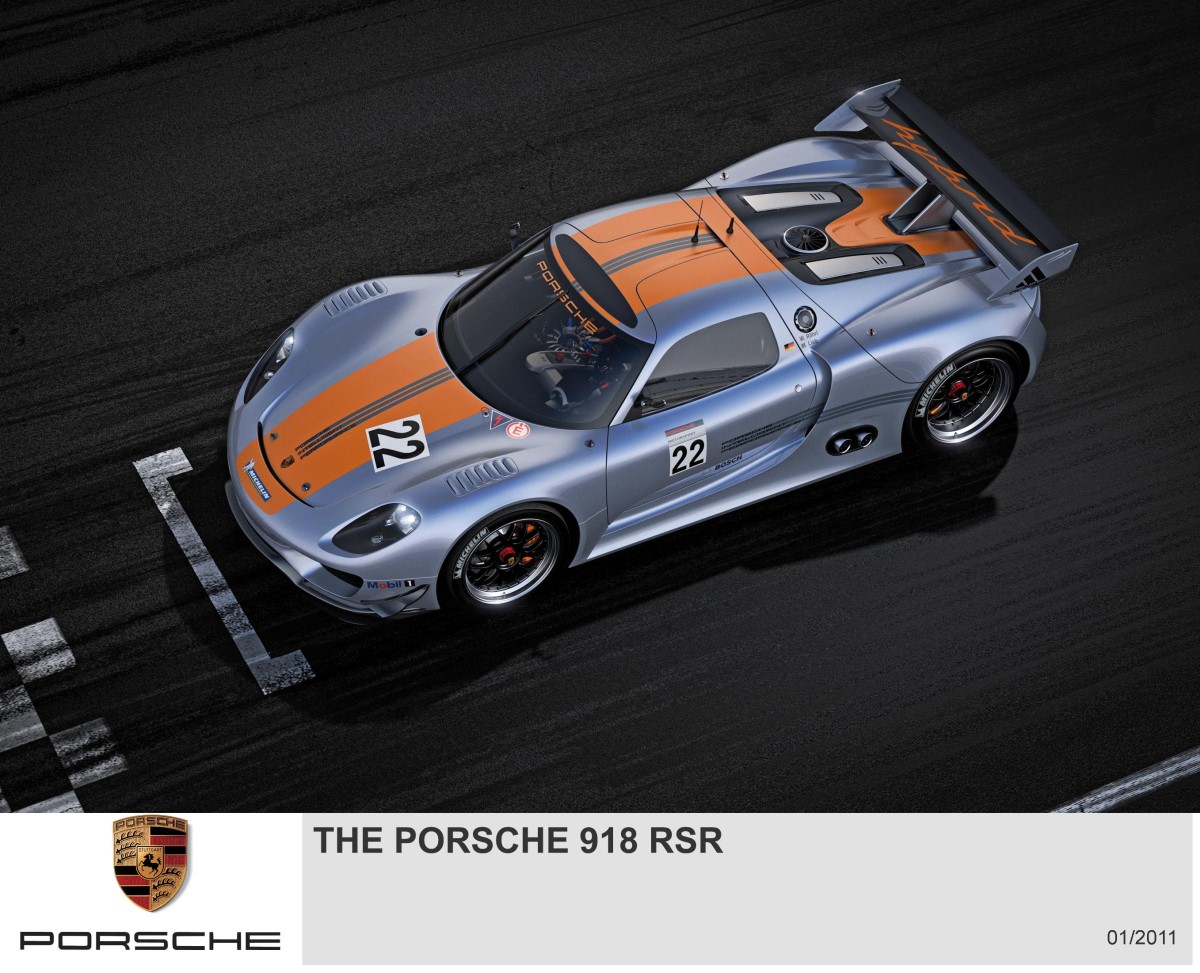 |
| Porsche 918 RSR |
Porsche continues to extend its performance and high efficiency competence via intensive development work in the field of hybrid technology, and the company is presenting a world premiere of a synthesis of 2010's successful hybrid concepts at the North American Auto Show in Detroit on January 10; the Porsche 918 RSR.
The Porsche 918 RSR is a two-seat mid-engined coupé that demonstrates what happens when the technology fitted in the 911 GT3 R Hybrid race car and the design of the 918 Spyder concept are combined to create a modern, innovative super sports car.
With its highly-efficient flywheel accumulator, the 911 GT3 R hybrid racing car attracted attention during competitive racing on the Nürburgring Nordschleife circuit, the American Le Mans Series races (ALMS) at Road Atlanta, USA and the Intercontinental Le Mans Cup at Zhuhai in China. Around these different circuits, the 911 GT3 R Hybrid – referred to internally as the ‘Race Lab’ – not only demonstrated its massive performance potential under realistic motor racing conditions against top competitors, but in actual fact surpassed the high expectations of Porsche Motorsport.
Competitiveness, high reliability and exemplary fuel efficiency combined with top performance underscored the Porsche technicians' basic idea of generating additional power in an intelligent manner. The 911 GT3 R Hybrid obtains its additional power from its own vehicle dynamics when braking – now, Porsche is transplanting this technology into the mid-engined coupé 918 RSR, the motor sports version of the 918 Spyder concept car.
From the tradition established by classic Porsche long-distance race cars such as the 908 long-tail coupé (1969) and the 917 short-tail coupé (1971), the Porsche designers created a link to the post-modernism of the ‘form follows function’ philosophy. In the 918 RSR, the elegant flow of the car’s lines is dominated by muscular wheel arches, dynamic air intakes and a pulpit-like cockpit. A visible fan wheel between the ram air intake tubes and a rear spoiler (with identical dimensions to that fitted on the RS Spyder race car) additionally emphasizes the racing laboratory function. The new ‘liquid metal chrome blue’ color which has been created emphasizes the sculptured curves of the forms, whilst the typical Porsche hybrid orange color on brake calipers and longitudinal stripes along the body lend remarkable touches.
Motor racing technology also dominates within the especially light, torsionally-stiff carbon fiber-reinforced plastic (CFRP) monocoque. The V8 engine is a further development of the direct injection engine from the successful RS Spyder race car, but for the 918 RSR it has been tuned to deliver an output of precisely 563 hp at 10,300 rpm. The electric motors on the two front wheels each contribute 75 kW (102 hp), i.e. a total of 150 kW (204 hp), to the peak drive power of exactly 767 hp. This additional power, which is generated during braking, is stored in an optimized flywheel accumulator.
In the 918 RSR, the two electric motors offer a torque vectoring function with variable torque distribution to the front axle. This additionally increases agility and improves steering response. Mounted upstream of the rear axle, the mid-engine is integrated with a racing transmission that is also based on that from the RS Spyder race car. This six-speed constant-mesh transmission with longitudinally-mounted shafts and straight-toothed spur gears is operated using two shift paddles behind the racing steering wheel. The car's functional equipment underscores its pure-bred motor racing character. Whether it is the characteristic doors which open obliquely upwards; the air intake in the roof between the wing doors; the quick-action latches on the front and rear CFRP lids; the two roof-mounted aerials for pit radio and telemetry; the small, lateral front aerodynamic flics akin to those seen on the RS Spyder; the air splitters beneath the front lip; or the racing slick tires on 19" wheels with single centre locking nut, the vehicle can be clearly recognized as an experimental racing laboratory itself.
In contrast to the 918 Spyder concept, an unadorned racing ambience predominates inside the 918 RSR. The figure-hugging bucket seat in brown leather alludes to the history of the gentleman driver; the gear flashes on the racing steering wheel and a recuperation display on the steering column in front of the display screen supply the driver with information. Instead of the futuristic, ergonomically avant-garde centre console with touch-sensitive user interface from the 918 Spyder concept car, the cockpit of the 918 RSR is split by a minimalistic console with rocker switches. Instead of a second seat, the flywheel accumulator is positioned to the right of the console.
This flywheel accumulator is an electric motor whose rotor rotates at up to 36,000 rpm to store rotation energy. Charging occurs when the two electric motors on the front axle reverse their function during braking processes and operate as generators. At the push of a button, the driver is able to call up the energy stored in the charged flywheel accumulator and use it during acceleration or overtaking maneuvers. The flywheel is braked electro-magnetically in this case in order to additionally supply up to 2 x 75 kW (totaling 150 kW) from its kinetic energy to the two electric motors on the front axle.
This additional power is available for around eight seconds when the system is fully charged. In the successful 911 GT3 R Hybrid, this additional power can also be used as a consumption aid depending on the racing situation, e.g. to delay pit stops or reduce the fuel tank volume and therefore the weight of the vehicle.
With the new 918 RSR racing laboratory, Porsche is now elevating this motor racing hybrid concept to an experimental level. In the 918 RSR, ‘Porsche Intelligent Performance’ equates to research into methods for further sustainable efficiency improvement under the intensified conditions of the race track, lap times, pit stops and reliability – disciplines in which Porsche has been demonstrating its success for over 60 years.
Finally, the starting number, 22, pays homage to the anniversary of a further triumph. Back in the days when overall victories in Le Mans were not yet an entirely routine matter within the Porsche racing department, drivers Dr. Helmut Marko and Gijs van Lennep were the first to cross the finishing line in the 1971 24-hour classic. The distance record set by their Porsche 917 short-tail coupé – 5335.313 kilometers (3315.21 miles) at an average speed of 222.304 km/h (138.13 mph) – did not remain unbeaten for an eternity, but for exactly 39 years until 2010. At the time, the Porsche 917 in the Martini colors was also an experiment and far ahead of its time: for example, its magnesium space chassis frame set new standards in the Porsche domain of lightweight construction.
